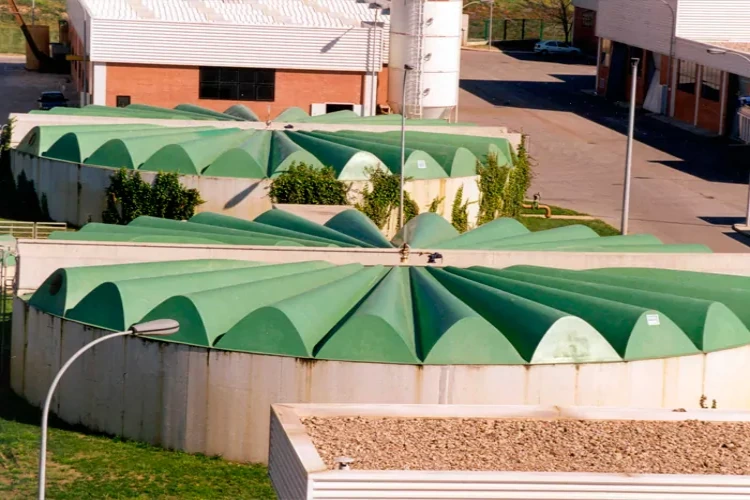Why Gas and Odour Emissions in WWTPs Are an Environmental Issue
Wastewater treatment plants (WWTPs) play a critical role in safeguarding public health and the environment. However, the treatment process itself can become a source of environmental concern if not properly managed — particularly when it comes to gas and odor emissions.
During various stages of wastewater processing, such as sludge thickening, primary sedimentation, and biological treatment, volatile compounds are released into the atmosphere. Among the most prevalent are hydrogen sulphide (H₂S), ammonia (NH₃), and organic mercaptans. These gases are not only unpleasant to smell, but they also pose health risks for workers and nearby communities. Prolonged exposure to hydrogen sulphide, for instance, can cause respiratory problems and, at higher concentrations, be life-threatening.
From an environmental standpoint, these emissions contribute to air pollution, accelerate corrosion in equipment and infrastructure, and undermine the sustainability goals of water management authorities.
In response, regulatory bodies across Europe and beyond are tightening controls on air quality around WWTPs. Odor management is no longer a secondary issue — it’s a key component of plant design and compliance. This is where modular FRP covers (fibre-reinforced plastic) come into play, forming an essential first line of defense by sealing off open tanks and channels, allowing for controlled gas capture and treatment.
How Modular FRP Covers Help Minimise Environmental Impact
Modular covers made from fibre-reinforced plastic (FRP) are an increasingly common solution for controlling emissions in wastewater treatment plants. Their core function is simple yet crucial: isolating odour and gas-emitting components of the treatment process — such as sludge tanks, screw conveyors, or grit chambers — from open-air exposure.
Key Environmental Benefits
Tecnium’s FRP Covers: Engineering for Sustainability
At Tecnium, environmental protection is not an add-on — it’s an integral part of every engineering decision. Our modular FRP (fibre-reinforced plastic) covers are designed with the specific challenges of wastewater treatment plants in mind, offering both operational performance and environmental safeguards.

Designed for Harsh Conditions
Tecnium covers are engineered using high-quality polyester reinforced with glass fibre, ensuring long-term resistance to corrosive environments. These include gases such as hydrogen sulphide (H₂S) and mercaptans, commonly found in sludge treatment areas, screw conveyors, and settling tanks. Thanks to a precise design process based on laminated structures and ribbed reinforcement, the covers maintain mechanical integrity even under extreme stress or high load scenarios.
Customised for Any WWTP Configuration
Whether for circular sludge tanks, rectangular biofilter beds, or screw conveyors, Tecnium offers tailored solutions that adapt to the layout of each facility. Options include:
These configurations provide full flexibility while maintaining a uniform aesthetic, with integrated colouring during the lamination phase and optional paint finishes that help blend into the site’s surroundings.

Maintenance-Free and Easy to Install
One of Tecnium’s greatest advantages lies in the reduced operational cost of its covers. The corrosion-free nature of FRP means no painting, rust treatment, or structural repairs — all of which are commonly required with metal solutions. In addition, the modular design allows for fast, safe assembly and disassembly during inspections or maintenance without specialised tools or teams.
Why WWTP Operators Choose FRP Covers for Compliance and Cost Efficiency
Case Studies: FRP Covers in Action
Designing for the Future: Tecnium’s Commitment to WWTP Innovation
As environmental regulations tighten and urban populations grow, the need for efficient, durable, and sustainable solutions in wastewater treatment becomes more urgent. Tecnium’s modular FRP cover systems are not only a response to current challenges — they are an investment in future-ready infrastructure.
Long-Term Environmental Impact
By containing emissions and reducing chemical exposure, these covers contribute directly to:
This aligns with broader sustainability goals and enhances public trust in water treatment operations.
Tailored Engineering for Modern Facilities
Tecnium’s engineering team collaborates closely with WWTP designers and plant managers to:
Whether upgrading legacy infrastructure or designing new installations, Tecnium delivers robust solutions that scale with operational needs.
Future-Oriented Materials and Design
Tecnium continually invests in material science and fabrication techniques to stay ahead of industry demands:
Protect the Environment While Future-Proofing Your Facility
At Tecnium, we understand that every wastewater treatment plant faces unique environmental and operational challenges. Our modular FRP cover systems offer a smart, compliant and sustainable solution for odour control, emissions reduction and long-term structural protection.
Get in touch with our engineering team today and discover how our tailored designs can support your facility’s environmental goals — efficiently, durably, and with zero compromise.
